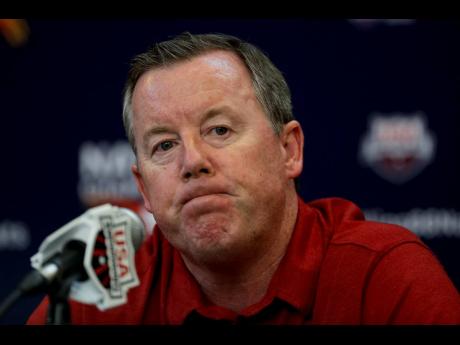No games, big losses: Money crisis faces US Olympic sports
DENVER (AP):
The postponement of the Tokyo Games has catapulted the sports organisations that make up the backbone of the US Olympic team into crisis.
At least one has already started lay-offs and others are desperate to stay solvent. Some are expecting a major downturn in membership dues, while others are reeling from event cancellations totalling more than 8,000 across all sports.
A database analysed by The Associated Press shows combined projected losses of more than $121 million in revenue between February and June for 43 of the 50 national governing bodies that responded to a survey from the National Governing Bodies (NGB) Council in the wake of the coronavirus crisis.
As much or more as the US Olympic and Paralympic Committee (USOPC), which serves as an umbrella regulator of the country’s Olympic sports, it’s the NGBs that provide funding and other support for athletes to pursue their dreams at the Olympic and other elite levels. About 80% of the typical NGB’s budget goes towards supporting athletes.
Not including the US Tennis Association – an outlier because of the massive revenue it generates from the US Open – the NGBs have a combined annual revenue of about $685 million. By comparison, the NFL and NBA each reportedly brought in about $8 billion during the latest completed season. Half the NGBs are little more than ma-and-pop operations, working with small staffs and on revenue not more than $5 million a year.
The USOPC, which sent cash grants to the individual NGBs to the tune of around $65 million in 2018, is also in uncharted territory. The postponement of the Olympics forces the federation to make up for a shortfall nearing $200 million without the NBC payout that comes during Olympic years.
The USOPC broke with recent practice by not taking out insurance against that possible loss, instead deciding to self-insure. Some of the shortfall is expected to come from an endowment fund created out of a surplus from the 1984 LA Olympics.
The USOPC says the losses across American sports could range from $600 million to $800 million. A good portion of these losses can be recouped if the games go forward, as expected, in 2021. But staying financially healthy until that time is not a given for some of the more vulnerable NGBs.
“I haven’t heard anyone say their NGB itself was going to go out of business,” said Max Cobb, the president of US Biathlon, who doubles as leader of the USOPC’s NGB Council. “But there’s very little buffer to absorb any revenue loss for an NGB. They all run on a very tight revenue and expense model, and very few have much in the way of savings.”
Already, USA Cycling, a mid-sized NGB with an approximate annual revenue of $15 million, laid off eight of its 70-person staff. And USA Rugby, which existed on about $14 million in revenue through 2017, was already teetering and could be nearing closer to bankruptcy with the added uncertainty the Olympic postponement has brought.
EVENT-DRIVEN EARNINGS
Many NGBs, such as cycling, are event-driven – reliant on cash brought when people sign up for local and national competitions that they sanction. Others, such as USA Swimming, get their lion’s share of funding from membership dues, which are taking a hit as facilities around the nation close on the order of state and local governments.
“We, as an NGB, will feel it next fall when memberships start rolling in. That shortfall could have a profound effect,” said USA Swimming’s Tim Hinchey. “We can overcome a lot of these things, I think, if all comes back to normal. But we have to wait and see like everyone else.”
The only event that makes money for swimming is its Olympic trials, which are also a significant revenue source for track, gymnastics and other sports that send large teams. All have been postponed, to be rescheduled when the IOC sets a new date for the Olympics in 2021.
The USOPC recently sent a letter to Congress asking for $200 million to be included in the $2 trillion coronavirus relief package that passed through the House of Representatives last Friday. The money, it said, was to be used to support about 2,500 athletes and to help NGBs, which have a total of about 4,500 full-time employees.

